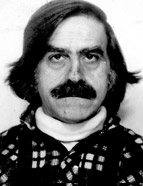

As far as this last segment of his life is concerned, both in history and literary criticism, as already mentioned, Saraiva reappropriated an interpretation model grounded on hermeneutics in reiterated opposition to the distinct forms of positivism and evolutionism. This choice implied rewriting some of his most important studies, not only on historiography but also on theory, to distance himself from the sociological model that had conditioned them. He thus proclaimed or lost his footing in lines that converged with the subjectivist course of an emerging post modernity. On this matter, see A Cultura em Portugal [Culture in Portugal] , Livro I [Book I] (1982), Livro II [Book II] (1984), O Crepúsculo da Idade Média em Portugal [The Twilight of the Middle Ages in Portugal] (1988).
In the meantime, the renowned university master widened his vast experience of the world with new journeys. Those by invitation of various universities and institutions to the Federal Republic of Germany and to the German Democratic Republic, to Venezuela, Brazil, the U.S.A., and Israel are particularly noteworthy. The subversive and radically innovative reflection he had dedicated to the problems of education in his younger years continued to motivate his regular interventions. His pro-ecologism shift in the wake of the French May 68 protest would not vanish from his mind. The last text he published in his lifetime in the Expresso newspaper fell under this area of political combat. In the last decades of public intervention, while decrying the illusions of the inevitably alienating technological progress he envisaged a nostalgically rural world which contrasted with contemporary hyper consumerism. A legacy left by Romanticism, reactivated by Heidegger at a contagious reflective-poetic level, and disseminated by the ecological movement in the early 1970s. To his mind, such progress would always condition new forms of social oppression and pose an exponential threat to the balance and sustainability of the planet. Scientific and technical progress inherent to the determinism and teleological beliefs of the positivist cognitive area, from which he also distanced himself in the name of a frugal life grounded on friendly unhierarchized interaction. His political vision was disseminated mainly in Raíz e Utopia [Roots and Utopia], a publication co-founded and managed by Saraiva, which ran between 1977 and 1981 and made him a media icon. This was also his last enthusiastic group ideological experience.
As regards his last historiographical or theoretical contributions, the award-winning P.E.N Club prize Tertúlia Ocidental [Western Tertulia] (1990) one of Saraiva’s most elaborate, formally subtle texts is worthy of mention. This was the last spark of a literary drive which, duly calibrated, was also present in his academic writings. By way of farewell, in this study he revisits the Vencidos da Vida [Life’s Vanquished], the above-mentioned Geração de 70.
